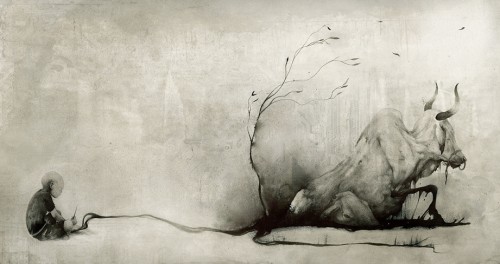No Answer
There’s a message on my phone tonight for someone named Moxie from someone named Mame. “Moxie. Moxie this is Mame. This is the last time I’m calling you, you bitch. If you don’t call back tonight I’ll shoot myself.” What else is there? The landlord says again he’ll fix the lightswitch when he can. Lena’s threatening to tell my friends. Some crackpot says “What the fuck kind of message is that, are you queer?” and then goes grr, rowr, squawk squawk. Nothing from the parents—that line’s dead. None of those angry messages I leave myself from time to time: “Why don’t you gut yourself, little fishy? What’s on your plate tonight, more excuses? If you don’t do something about yourself, I will.” There’s a quickie from my sister, she’s sad because she’s fat. And another one from Mame. “Hey, Moxie, guess what, I changed my mind. I’ll be there in ten minutes. Why should I shoot myself when you’re such a beautiful target?”
Photographer, Gulf Coast
We much admired the man with the camera, who came into this place—this place!—and offered to photograph anyone's tattoo. The first ones were obvious, local musclemen goofing on this nerdy guy with the expensive gear they probably figured on stealing. The leader of the pack gave up a biceps with a dripping blade, then one of his buddies showed two circling dogs that, when he rolled his abdominals, licked each others' anuses. Another stud stepped up, fluttered his pectorals: a classic, the hula girl's grass skirt shimmied like a wind-up doll's, her dark head bobbed.
Others started to line up, mostly with cruder images—a stretching cock, a waggling ass. Cruder still, Mom-in-a-Heart, and yet another flag.
Then some of the girls came forth and inched down their pants to show another world of wishes, disguises, and resentments realized: a pink star, some puppydogs, a delicate fairy princess low on a belly that must have stung like wasps. Tricky lizard in bright green, climbing the steep wall of a throat. One quiet brown girl leaned forward and her friend slid her silk shirt carefully up her back: a full-size, perfect head of Martin Luther King, must have taken three hours to carve there.
The camera man looked to be in shock, and he wasn't alone—mostly this had been invisible, and now it had been called forth and seized him like so many foreign viruses. He was sweating as with a foreign virus, and his camera started to look like what one of those might look like. He thanked us all, but wondered aloud, mostly to himself, "So these are the things you'll let yourselves suffer for—decorating you always...."
A thin woman, maybe fifty, oriental, spoke up then: "If you let me hold your camera, I'll show you one you'll really like." She added, "But I think you'll also want a drink."
He handed it over and ordered Irish whiskey, which I think seemed right to us, a good drink for a day devoted to tattoos.
She sat and faced him at the bar, his camera in her lap. She undid the buttons of her blouse and exposed her left breast. All around that tender skin were traced in firm lines of red, blue, green, and dark purple a dense garden of roses, tulips, and orchids, threaded tortuously with spikey, dripping vines. It was like a jungle there, and peering close he could see (we could all see) that all along the vines were perched dozens of birds, mostly gray with crimson beaks. It was clear that they were birds of prey as from their claws along the vines hung limp small animals, perhaps mice and rats and rabbits, even smaller birds, their necks perfectly snapped, their eyes black dusty pearls.
The photographer seemed unable to speak, and anyway she raised her hand to keep him still. No one else said anything either. "This is my little garden of life," she said. "Don't mind the dead things, they belong there. Once in Vietnam I saw a helicopter crash in a garden much like this one. My sister had been hiding there, she burnt. My parents came here, I became a dancer, it surprised us all. Something in me felt like bright flowers and soaring birds whenever I saw dancers, so I just did it, as anyone might."
The man tried to speak then, but she silenced him again. "No room for questions now. Or answers, either. Everything grows in its own way, which can't be justified or condemned. I danced while I could, then I couldn't, and then one day...." She opened the shirt to show her right breast then, where it should have been. All there was was purple scar, covered with a spidery black script of symbols.
As the man's eyes staggered over this senseless spot, she leaned back and quickly took his picture with his camera. "There," she said. "I want you to have the look in your eyes right now cut into your brain forever. That will make all this worth telling. That is what this other side must mean, if it means anything. The writing is Cambodian. It tells the story of a lonely peasant girl who stole a princess's favorite silver bowl. When she did, the princess's kitten ran away to be near it. Then the kitten's best friend, the princess's little dog, sneaks off to join the kitten and the peasant girl. Next the princess's waiting-girl runs off to find the dog, but winds up staying. You get the picture, right? The princess's little brother joins them next, and then her aunt and uncle, her grandparents, finally her parents, and then the princess is alone, and the peasant girl is surrounded by all this love and family. But the peasant girl sees that the princess is alone and takes pity, and asks the princess to come live with her, the kitten, the dog, and all the others. She does, but she's still unhappy. And so she steals the bowl back and runs away. And one by one, everyone returns to her until the peasant girl is left alone again. I believe," the woman said, "that the story keeps on moving this way, as oriental stories sometimes do, back and forth with gentle shifts and twists—it could go on forever. But the tattoo woman must have lost her heart—it seemed she couldn't bring herself to write more than I've said, or maybe she just ran out of ink. In any case, she just curved the writing back on itself so that it loops into a circle—not the same thing at all, is it?"
The photographer snatched his camera back and hurtled out the door like he'd been thrown. "He won't be back," the woman said. She covered up her chest. The others covered up their bellies and their buttocks, their biceps, triceps, abdominals, and pectorals, and a few of them pulled their sleeves down to their wrists. Some clutched their collars tight around their necks as if there were a chill. Some of us covered up our faces.
Editor's Note: Don't miss "The Big Bang of Prose Poetry," Carol Dorf's introduction to prose poetry in TW.
 Jerry McGuire’s third book, Venus Transit, won the 2012 Outriders Poetry Project Competition and will be published in the spring of 2013.
Jerry McGuire’s third book, Venus Transit, won the 2012 Outriders Poetry Project Competition and will be published in the spring of 2013.
He lives in Lafayette, Louisiana, and teaches creative writing, poetics, and film studies at the University of Louisiana at Lafayette.

